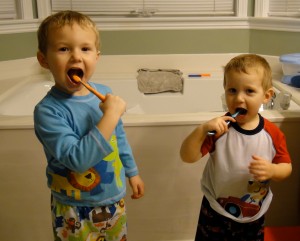Children's Dental Health Month is Here!
Children's Dental Health Month
Are My Child’s Teeth Coming In On Schedule?
As parents we can’t wait for that first tooth to appear. But after those first two top and bottom teeth come in, most parents don’t really know when to start expecting to see the rest. It is important to have a general idea of when the remaining teeth should be erupting. Slow or no additional new teeth could be a warning sign to check for certain metabolic disorders. While teething can begin in babies as young as four months, generally the first tooth doesn’t show up until between the ages of eight to twelve months. Usually the two front bottom teeth come in first and then the top four front teeth are next. All of these teeth are called the central incisors.
After the first teeth break through the gums the remaining twenty teeth slowly begin to fill in, again generally in pairs. The lateral incisors or side front teeth are next, followed by the first molars which are those back teeth that handle the majority of chewing. The pointy teeth, next to the front teeth, known as the canines will then appear; while the very back teeth or second molars are the last to come through. Most children will have all their primary or baby teeth by the time they are three years old. These teeth will stay in place for anywhere from a year to three years before starting to be replaced with the permanent teeth.
Front teeth or central incisors: 8 to 12 months Side front teeth or lateral incisors: 9 to 13 months First molars: 13 to 19 months Canines: 16 to 22 months Second molars: 25-33 months
It is important to take care of your child’s primary teeth even though they will only be with them for a couple of years. Good oral hygiene will keep the permanent teeth forming below the surface healthy. The experienced staff at Ellis Dental can assist in all your child’s dental health needs. Please contact us today for more information.
Five Ways to Protect Your Child’s Teeth
 Preventive dental care for your child is vitality important and neglecting their oral hygiene can have long-term damaging effects.
Preventive dental care for your child is vitality important and neglecting their oral hygiene can have long-term damaging effects.
- Even before that first tooth erupts it’s important to clean your child’s gums on a daily basis by using a soft cloth or a piece of gauze dipped in warm water and gently rubbing.
- Start brushing as soon as one tooth appears and begin to floss when your child has two teeth that touch each other. Brushing should be done twice a day but if that isn’t possible make sure your child always brushes before going to bed.
- Don’t put your child to bed with a bottle and once off the bottle, limit how frequently they use a sippy cup. Anything other than water can cause bacteria to grow which in turn causes the acid that creates tooth decay. Plus the constant pressure of a nipple or hard plastic spout can affect the “bite” or shape of the mouth.
- Introducing your child at a very early age to good nutrition will help with good dental health. Limit juice to mealtime or as a special treat and don’t just assume because a snack is suppose to be “healthy” that it isn’t damaging to your child’s teeth. Things like granola bars and dried fruit are sticky and can leave residue on the teeth.
- Pay attention to the medications your child is prescribed. Many have a sweet sugary base that lingers on teeth after the medication is taken. Make sure to have your child rinse their mouth or brush their teeth after dosing.
For more helpful tips on how to care for your child’s teeth or to schedule their first dental appointment, please contact Ellis Dental today.
Your Child’s First Dental Visit
 Probably growing up you didn’t visit a dentist until after your permanent teeth were in place. Now studies indicate a child’s first dental visit should be approximately six months after their first tooth erupts. Your child’s primary or “baby” teeth should be in place by the time they are three years old, and have a complete set of permanent teeth by the age of twelve. And no matter if the teeth are primary or permanent; they still need to be properly maintained to avoid tooth decay which can occur at any age.
Also, perhaps as a child you like many of us were afraid to go to the dentist because of all the scary equipment and the potential for pain. By acclimating your child to the dentist from a very early age before fear becomes a factor, they will be more likely to practice good oral health and the stress felt during those bi-yearly visits will be reduced.
Probably growing up you didn’t visit a dentist until after your permanent teeth were in place. Now studies indicate a child’s first dental visit should be approximately six months after their first tooth erupts. Your child’s primary or “baby” teeth should be in place by the time they are three years old, and have a complete set of permanent teeth by the age of twelve. And no matter if the teeth are primary or permanent; they still need to be properly maintained to avoid tooth decay which can occur at any age.
Also, perhaps as a child you like many of us were afraid to go to the dentist because of all the scary equipment and the potential for pain. By acclimating your child to the dentist from a very early age before fear becomes a factor, they will be more likely to practice good oral health and the stress felt during those bi-yearly visits will be reduced.
What to expect:
- Schedule their appointment for early in the day so they won’t be tired and fussy.
- The first visit will consist of a gentle oral exam to check for any problems and if needed, a cleaning and polishing.
- Depending on the age of the child, X-Rays may be warranted.
- Cleaning a toddler’s teeth can be a bit difficult so we’ll demonstrate correct brushing techniques and answer any questions you may have.
- From the age of six months to sixteen, fluoride is very important for a child’s teeth. During this first visit we’ll explain the need for fluoride and suggest ways more can be applied.
Please call Ellis Dental today to schedule your child’s first dental appointment. We can’t wait to meet your little darling!





